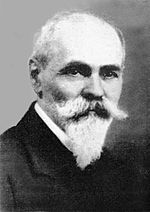Stanislaw Zaremba
Stanisław Zaremba (born October 3, 1863 in Romanówka , † November 23, 1942 in Cracow ) was a Polish mathematician at the Cracow School of Mathematics . Analysis , especially Fourier analysis , was a focus of his work .
Zaremba was the son of an engineer and went to school in Saint Petersburg , where he also studied engineering at the Polytechnic. He then went to Paris , where he received his doctorate in mathematics at the Sorbonne in 1889 (Sur unproblemème concernant l'état calorifique d'un corp homogène indéfini) . In Paris he also made contacts with French mathematicians such as Édouard Goursat and Paul Painlevé . After receiving his doctorate, he taught in French schools and published in French mathematical magazines. In 1900 he returned to Poland and became a professor at the Jagiellonian University in Krakow . He wrote a variety of textbooks and in 1919 was co-founder and president of the Polish Mathematical Society (then until 1920 Mathematical Society of Cracow). For many years he published their annals.
Zaremba dealt with many areas, in addition to Fourier analysis for example with axiomatization of mechanics, elliptical partial differential equations ( Dirichlet principle , potential theory ) and hyperbolic partial differential equations and elasticity theory .
Zaremba played an important role in the establishment of an independent Polish school of mathematics, which flourished between the two world wars and achieved outstanding international importance.
He was an honorary doctor of the Universities of Cracow, Poznań and Caen. In 1924 he was accepted as a corresponding member of the then Soviet Academy of Sciences .
His son Stanisław Krystyn Zaremba (1903–1990) was also a mathematician and a well-known alpinist.
Individual evidence
- ^ Foreign members of the Russian Academy of Sciences since 1724. Stanisław Zaremba. Russian Academy of Sciences, accessed August 31, 2015 (Russian).
Web links
- Biography (polish)
- John J. O'Connor, Edmund F. Robertson : Stanisław Zaremba. In: MacTutor History of Mathematics archive .
| personal data | |
|---|---|
| SURNAME | Zaremba, Stanislaw |
| ALTERNATIVE NAMES | Zaremba, Stanislas |
| BRIEF DESCRIPTION | Polish mathematician |
| DATE OF BIRTH | October 3, 1863 |
| PLACE OF BIRTH | Romanówka |
| DATE OF DEATH | November 23, 1942 |
| Place of death | Krakow |
